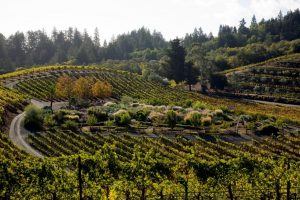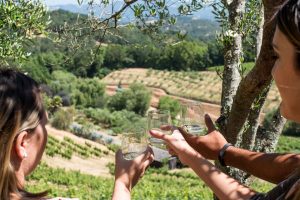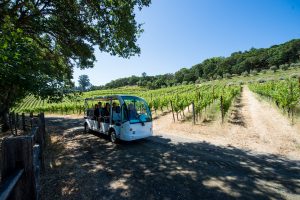Global S&T Development Trend Analysis Platform of Resources and Environment
| Sustainable wine pioneer brings biodynamic farming practices to cannabis | |
| admin | |
| 2019-07-03 | |
| 发布年 | 2019 |
| 语种 | 英语 |
| 国家 | 国际 |
| 领域 | 资源环境 |
| 正文(英文) | While most winery owners in California’s Sonoma Valley grew concerned when the water table began sinking in the 1980s and ‘90s, Mike Benziger had a different response. He began searching for farming methods that required less water.  Mike Bezinger is the founder of Bezinger Family Winery in Glen Ellen, Calif. The winery takes a sustainable approach to water use with a practice called “biodynamic farming.” Photo courtesy of Bezinger Family Winery. It wasn’t just the lower water level that drove him. Irrigation pumping costs had been one of the biggest expenses in the years since he began growing wine grapes in 1980, Benziger explained. Through research, Benziger found that by designing vineyards that needed less water and altering their farming practices, the Benziger Family Winery in Glen Ellen, Calif., could also make its wines more distinctive, enabling them to stand out from crowded field of Sonoma wines. Biodynamic farmingThat research led the family to biodynamic farming. “Biodynamics is basically recycling all the products within your property and reducing inputs,” explained Paige Cole, a Benziger winery employee. This “ultra-organic” farming method promotes natural systems and create habitats that minimize or eliminate the need for pesticides, fertilizer, and imported water. The farm’s transition to biodynamics began in the mid-1990s. To reduce water demand, water-thirsty plants were replaced with olive trees and crops that attracted “beneficial insects,” Benziger explained. When choosing grape plants, Benziger searched for small species with deep rootstalks. The deeper the roots went, Benziger explained, the closer they got to nutrients and more permanent sources of water – and the less irrigation they would require. Previously, the Benziger winery had been designed to kill bugs, weeds – practically everything but the grapevines themselves, explained Cole. “Our sustainable practices have helped us build and maintain a vibrant, healthy environment. It enhances the sustainability of the property for years, if not generations, to come,” she said. The result? The land regenerated, and Benziger became the first certified biodynamic winemaker in Napa and Sonoma counties. Conservation beyond the grapes As the first certified biodynamic farming vineyard in wine-rich Napa and Sonoma counties, the Bezingers show how operating a large-scale agricultural operation can conserve water and enhance the environment. Photo courtesy of Bezinger Family Winery. Water conservation strategies at the winery extend beyond the vineyards. Wetlands and recycling ponds constructed on the property make it possible to recycle up to 11.3 million L (3 million gal) of wastewater and graywater each year for landscaping and irrigation. Easy-to-clean vibration technology developed by the family cuts water usage at harvest by up to 20%. The steam method used to clean wine barrels reduces the amount of water needed to clean each barrel from 95 L (25 gal) to just 19 L (5 gal), according to Benziger. Benziger’s contributions to winery water conservation earned him the Natural Resources Defense Council’s (New York) Green Growing Award for Water Stewardship in 2015. New crops, same water-saving techniquesThat same year, Benziger sold and walked away from the wine business to focus on a different kind of farming. Today, he and his wife, Mary, operate the 3-ha (8-ac) GlenTucky Family Farm on Sonoma Mountain. The biodynamic farm grows a variety of fruits and vegetables from arugula to pomegranates. Benziger, who fought two separate bouts of cancer in recent years, also devotes a portion of his land to 50 medicinal marijuana plants. Allowed for medicinal purposes for more than two decades, cannabis became legal for recreational use in California in 2018. The same technologies that enabled Benziger to reduce water requirements for grapes have proven equally effective with cannabis.  In 2015, the Bezingers broke into a lucrative new business — growing cannabis. They apply the same eco-conscious farming practices to their herbs as they do to their wine grapes. Photo courtesy of Bezinger Family Winery. Grape plants require more water in the beginning and less when they reach maturity, he explained. Cannabis takes less water initially, with the greatest need occurring from mid-vegetation to about a month before harvest. Soil moisture meters at the 6-, 12-, 18- and 24-inch levels track how wet or dry the soil is. “We also measure plant stress with a porometer and/or a pressure bomb, which tells us how thirsty the plant is for water,” he added. A sophisticated weather station tracks historical data on the weather’s effects on soil conditions. Using these techniques, the farm reduced water use to just 7.2 L (1.9 gal) per cannabis plant per day during the period of greatest need, compared to the average of 19 L/d (5 gal/d) required industry-wide. Benziger said he sells 80%of his crop to dispensaries, with the remaining 20% given away to seriously ill patients who can’t afford medical cannabis. California’s tight water supply, Benziger might say, has been a blessing in disguise. — Mary Bufe, WEF Highlights |
| URL | 查看原文 |
| 来源平台 | Water Environment Federation |
| 文献类型 | 新闻 |
| 条目标识符 | http://119.78.100.173/C666/handle/2XK7JSWQ/134563 |
| 专题 | 资源环境科学 |
| 推荐引用方式 GB/T 7714 | admin. Sustainable wine pioneer brings biodynamic farming practices to cannabis. 2019. |
| 条目包含的文件 | 条目无相关文件。 | |||||
| 个性服务 |
| 推荐该条目 |
| 保存到收藏夹 |
| 查看访问统计 |
| 导出为Endnote文件 |
| 谷歌学术 |
| 谷歌学术中相似的文章 |
| [admin]的文章 |
| 百度学术 |
| 百度学术中相似的文章 |
| [admin]的文章 |
| 必应学术 |
| 必应学术中相似的文章 |
| [admin]的文章 |
| 相关权益政策 |
| 暂无数据 |
| 收藏/分享 |
除非特别说明,本系统中所有内容都受版权保护,并保留所有权利。
修改评论